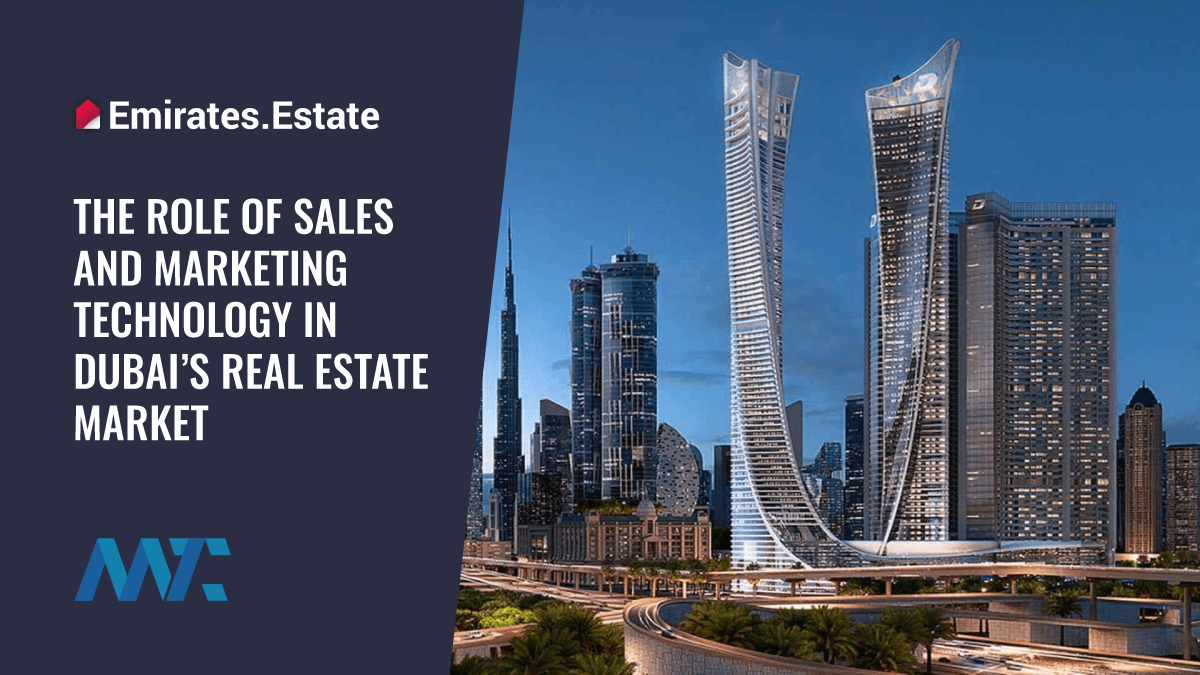Dubai’s real estate market has cemented itself as one of the most dynamic and profitable property markets globally. Known for its high-end developments, futuristic skyline, and investor-friendly policies, Dubai attracts a broad spectrum of buyers, from international investors to luxury homeowners. As the city continues to evolve, so do the methods used to market and sell real estate. In an increasingly competitive environment, real estate professionals are turning to sales and marketing technology to stay ahead of the curve, enhance customer engagement, and close deals faster.
The Technological Evolution of Dubai’s Real Estate Market
Real estate in Dubai has come a long way since its early days. The manual processes that once defined the industry are now replaced by sophisticated digital tools that automate marketing, analyze data, and predict future market trends. Sales and marketing technologies enable agents, developers, and investors to connect more efficiently and deliver more personalized experiences to prospective buyers.
From Customer Relationship Management (CRM) systems and artificial intelligence (AI) to social media marketing and digital advertising, the real estate industry in Dubai is increasingly embracing technology to gain a competitive edge. These tools are helping professionals maximize lead generation, provide exceptional customer service, and close deals quickly.
In an era where buyers have more choices than ever, particularly in high-end markets, personalized marketing, and seamless sales processes are crucial. For example, properties like waterfront villas and premium apartments require specialized marketing strategies to attract discerning buyers. In this context, integrating technology into sales and marketing strategies is revolutionizing how real estate transactions are conducted in Dubai.
Personalization Through Technology: Tailored Experiences for Buyers
One of the most profound impacts of sales and marketing technology in real estate is the ability to offer highly personalized experiences. With the advent of data analytics and machine learning (ML), real estate agents can now understand buyer preferences on a deeper level, tailoring their offerings to meet individual needs. Advanced CRM systems allow agents to track buyer behavior and use this data to offer properties that match their preferences, from the size and location of the property to the amenities offered.
For instance, international buyers interested in high-end properties often seek luxury villas with added features like pools, gyms, or waterfront views. Real estate agents can now offer highly tailored property suggestions to these buyers based on their search history, preferences, and behavior online. For those searching for the ultimate luxury experience, why not purchase a villa with a pool in Dubai? These premium properties cater to a global clientele, often combining sleek architectural designs with the lavish amenities that buyers expect from the Dubai market.
Enhancing Property Showcasing with Virtual Reality and 3D Tours
One of the most significant challenges real estate agents face is getting buyers to visit properties physically, especially for international investors. Sales and marketing technology have provided solutions in the form of virtual reality (VR) and 3D property tours. These innovations have revolutionized property showcasing, enabling buyers to experience properties from anywhere in the world without the need for an on-site visit.
Virtual reality and 3D tours allow potential buyers to take a digital walkthrough of a property, exploring every room, nook, and cranny as if they were there in person. This technology has become particularly useful in Dubai’s luxury real estate market, where many buyers are located overseas. High-quality 3D tours, combined with drone footage of expansive properties, allow potential investors to get a comprehensive understanding of a property’s layout, features, and surroundings.
For example, villas with private pools, stunning waterfront views, and expansive gardens can be showcased in full detail, offering a true sense of luxury and exclusivity. This type of immersive technology plays a crucial role in engaging high-net-worth individuals and serious investors who may be on the fence about making the journey to Dubai for an in-person viewing.
AI-Powered Lead Generation and Marketing Automation
The rise of artificial intelligence (AI) and automation has had a profound impact on sales and marketing within Dubai’s real estate sector. AI-driven tools help real estate professionals manage massive datasets, identify leads, and craft personalized marketing messages. These systems use machine learning algorithms to analyze buyer behavior, preferences, and interactions, allowing agents to target the right prospects with the right messages at the right time.
CRM systems powered by AI allow real estate agents to streamline their workflows, providing instant updates and reminders for follow-up calls, emails, and appointments. Automation tools help nurture leads by sending targeted messages at various stages of the buyer’s journey, ensuring that prospects remain engaged without requiring constant manual intervention from the agent.
For example, an agent who is marketing villas in a prestigious Dubai neighborhood can use AI to analyze which listings are generating the most interest and at what time potential buyers are most likely to engage with email marketing campaigns. By automating these interactions, agents can focus on more high-value tasks like closing deals or offering personalized tours to serious buyers.
Data-Driven Decision Making for Investors and Developers
Investors and developers are increasingly relying on data analytics to make informed decisions in Dubai’s real estate market. Sales and marketing technologies enable them to gather and analyze vast amounts of data about buyer demographics, preferences, market trends, and property performance. This data-driven approach allows investors to make smarter decisions about where and when to invest, which types of properties are likely to yield the highest return, and how to price properties competitively.
For example, predictive analytics can help developers anticipate future trends in the market, such as the demand for eco-friendly properties or smart homes equipped with the latest technology. This insight allows developers to tailor their projects to the evolving needs and preferences of buyers, ensuring that their properties remain attractive and competitive in the market.
For real estate investors, data analytics provide a wealth of information about the performance of different property types, locations, and market conditions. This helps investors make informed decisions about whether to invest in off-plan properties, luxury villas, or high-rise apartments in downtown Dubai. By leveraging data, investors can optimize their portfolios for maximum profitability.
The Power of Social Media and Digital Advertising
Social media platforms and digital advertising have become indispensable tools in Dubai’s real estate marketing landscape. Platforms like Instagram, Facebook, LinkedIn, and YouTube offer real estate agents and developers a powerful way to showcase properties, reach targeted audiences, and build brand awareness. Luxury real estate, in particular, benefits from the visual nature of platforms like Instagram, where high-quality images and videos can capture the attention of affluent buyers.
Paid digital campaigns using pay-per-click (PPC) and social media ads enable real estate companies to target specific demographics, such as high-net-worth individuals, expatriates, or families looking for luxury homes. By creating highly targeted campaigns, agents can reach potential buyers who are most likely to be interested in premium properties like villas with pools, waterfront homes, or high-rise apartments with city views.
These digital campaigns often include video tours, drone footage, and immersive 3D experiences that allow buyers to explore properties virtually before making a decision. Social media marketing, combined with robust digital advertising strategies, enables real estate professionals in Dubai to reach a global audience with minimal effort.
Conclusion: The Future of Real Estate Sales in Dubai
The integration of sales and marketing technology has forever changed the way real estate transactions are conducted in Dubai. From AI-powered CRMs and data-driven marketing strategies to immersive virtual reality tours and automated lead nurturing, these innovations are helping real estate professionals engage with buyers in more personalized, efficient, and effective ways.
For buyers, these technologies provide a seamless experience, whether they are searching for a luxury villa with a pool, a penthouse in the heart of the city, or an off-plan investment opportunity. As Dubai’s real estate market continues to grow, the adoption of these cutting-edge tools will only become more essential for staying competitive and meeting the evolving needs of today’s tech-savvy buyers.



